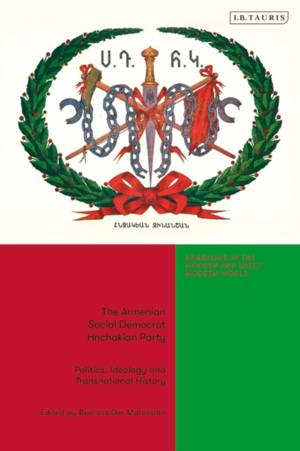
Door een staking bij bpost kan je online bestelling op dit moment iets langer onderweg zijn dan voorzien. Dringend iets nodig? Onze winkels ontvangen jou met open armen!
- Afhalen na 1 uur in een winkel met voorraad
- Gratis thuislevering in België vanaf € 30
- Ruim aanbod met 7 miljoen producten
Door een staking bij bpost kan je online bestelling op dit moment iets langer onderweg zijn dan voorzien. Dringend iets nodig? Onze winkels ontvangen jou met open armen!
- Afhalen na 1 uur in een winkel met voorraad
- Gratis thuislevering in België vanaf € 30
- Ruim aanbod met 7 miljoen producten
Zoeken
The Armenian Social Democrat Hnchakian Party
Politics, Ideology and Transnational History
€ 203,95
+ 407 punten
Omschrijving
This book, based on new research, sheds light on the history of the Social Democrat Hnchakian Party, a major Armenian revolutionary party that operated in the Ottoman Empire, Russia, Persia and throughout the global Armenian diaspora. Divided into sections which cover the origins, ideology, and regional history of the SDHP, the book situates the history of the Hnchaks within debates around socialism, populism, and nationalism in the 19th and 20th centuries. The SDHP was not only an Armenian party but had a global Marxist outlook, and scholars in this volume bring to bear expertise in a wide range of histories and languages including Russian, Turkish, Persian and Latin American to trace the emergence and role this influential party played from their split with the Armenian Revolutionary Federation and the events of the Armenian genocide to the formation of the first Armenian Republic and then Soviet Armenia. Putting the Hnchaks in context as one of many nationalist radical groups to emerge in Eurasia in the late 19th century, the book is an important contribution to Armenian historiography as well as that of transnational revolutionary movements in general.
Specificaties
Betrokkenen
- Uitgeverij:
Inhoud
- Aantal bladzijden:
- 296
- Taal:
- Engels
- Reeks:
Eigenschappen
- Productcode (EAN):
- 9780755651375
- Verschijningsdatum:
- 30/11/2023
- Uitvoering:
- Hardcover
- Formaat:
- Genaaid
- Afmetingen:
- 156 mm x 234 mm
- Gewicht:
- 585 g

Alleen bij Standaard Boekhandel
+ 407 punten op je klantenkaart van Standaard Boekhandel
Beoordelingen
We publiceren alleen reviews die voldoen aan de voorwaarden voor reviews. Bekijk onze voorwaarden voor reviews.










